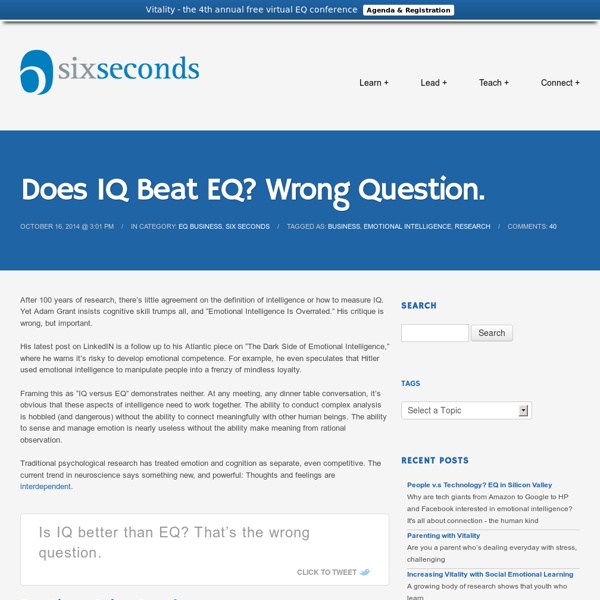Is Emotional Intelligence Overrated? Forget IQ versus EQSix Seconds

The Importance of Emotional Intelligence in the Workplace
By Mike Poskey, ZERORISK HR, Inc. Emotional Intelligence Quotient, or EQ, is a term being used more and more within human resources departments and which is making its way into executive board rooms. This article will help shed some light on what EQ is, how it is different than personality, and how it has proven to impact the bottom line in the workplace. What is Emotional Intelligence? Emotional Intelligence Quotient is defined as a set of competencies demonstrating the ability one has to recognize his or her behaviors, moods, and impulses, and to manage them best according to the situation. Additional, though less often mentioned qualities include selection of work that is emotionally rewarding to avoid procrastination, self-doubt, and low achievement (i.e., good self-motivation and goal management) and a balance between work, home, and recreational life. "People see what they want to see." How is EQ Different from Personality? EQ Competencies that Correlate to Workplace Success
Emotional intelligence
Emotional intelligence (EI) can be defined as the ability to monitor one's own and other people's emotions, to discriminate between different emotions and label them appropriately, and to use emotional information to guide thinking and behavior.[1] There are three models of EI. The ability model, developed by Peter Salovey and John Mayer, focuses on the individual's ability to process emotional information and use it to navigate the social environment.[2] The trait model as developed by Konstantin Vasily Petrides, "encompasses behavioral dispositions and self perceived abilities and is measured through self report" [3] The final model, the mixed model is a combination of both ability and trait EI, focusing on EI being an array of skills and characteristics that drive leadership performance, as proposed by Daniel Goleman.[4] It has been argued that EI is either just as important as one's intelligence quotient (IQ). History[edit] Definitions[edit] Ability model[edit] Measurement[edit]
Emotional Intelligence theories
This webpage is a new format for mobile/small screens. Please send your feedback if it fails to operate well. Thanks. emotional intelligence theory (EQ - Emotional Quotient) Emotional Intelligence - EQ - is a relatively recent behavioural model, rising to prominence with Daniel Goleman's 1995 Book called 'Emotional Intelligence'. Emotional Intelligence links strongly with concepts of love and spirituality: bringing compassion and humanity to work, and also to 'Multiple Intelligence' theory which illustrates and measures the range of capabilities people possess, and the fact that everybody has a value. The EQ concept argues that IQ, or conventional intelligence, is too narrow; that there are wider areas of Emotional Intelligence that dictate and enable how successful we are. Different approaches and theoretical models have been developed for Emotional Intelligence. emotional intelligence - two aspects Understanding yourself, your goals, intentions, responses, behaviour and all.
Related:
Related:



